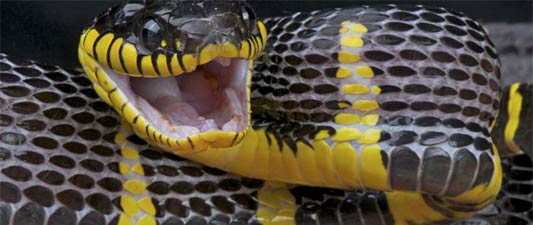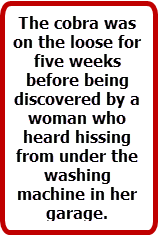Florida FWC Should Consider Ban on Venomous Snakes as Pets
 Posted
September 5, 2016 04:15 am | Op-Ed
Posted
September 5, 2016 04:15 am | Op-Ed
News that yet another venomous snake escaped from a Florida home — this time a cobra in Homestead — should concern all Floridians. Although many states ban private ownership of venomous snakes, Florida does not. Coincidentally, the Florida Fish and Wildlife Conservation Commission is scheduled to consider tightening the rules regarding possession of venomous snakes at its Sept. 9 meeting in St. Augustine.

Venomous snakes are not suitable as pets and individuals who harbor venomous reptiles such as cobras, vipers, or mambas pose special dangers to emergency responders and the community. Snakes can attack in the blink of an eye. While some caging may be more secure and structurally sound than others, there is no such thing as an escape-proof cage or a zero percent chance of human error.
Too many Florida communities have had to deal with escaped snakes.
Families, children and pets are endangered when
snakes escape into neighborhoods, and public safety
workers risk injury or even death while
 searching
for dangerous reptiles at large. In addition, taxpayers
routinely foot the bill for costs related to escapes,
attacks, and confiscations, since police, animal
control, and other emergency personnel must respond to
these incidents. When a 10-foot King Cobra escaped from
a home near Orlando, snake handlers and wildlife
officers searched the home and wooded 10-acre property
and set traps. Four officers were stationed at the
perimeter of the property to watch for the snake and
other officers searched a nearby elementary school. The
school canceled all outdoor activities and parents were
asked to accompany students who walked or biked to
school. The cobra was on the loose for five weeks before
being discovered by a woman who heard hissing from under
the washing machine in her garage.
searching
for dangerous reptiles at large. In addition, taxpayers
routinely foot the bill for costs related to escapes,
attacks, and confiscations, since police, animal
control, and other emergency personnel must respond to
these incidents. When a 10-foot King Cobra escaped from
a home near Orlando, snake handlers and wildlife
officers searched the home and wooded 10-acre property
and set traps. Four officers were stationed at the
perimeter of the property to watch for the snake and
other officers searched a nearby elementary school. The
school canceled all outdoor activities and parents were
asked to accompany students who walked or biked to
school. The cobra was on the loose for five weeks before
being discovered by a woman who heard hissing from under
the washing machine in her garage.
All too often, taxpayer-funded zoos absorb the costs of supplying antivenin when a private owner gets bitten. Antivenin, especially for exotic snake species, is expensive, can be difficult to locate, and may have to be flown in from another state. Depleting antivenin supplies to save the life of a pet owner puts zoo professionals at risk. The fact that many reptile collectors keep more than one species of venomous reptile has created confusion for paramedics and hospital emergency room staff about what antivenin a person — who is often unconscious — needs once bitten.
All reptiles require specialized expertise and care and many suffer from starvation, dehydration, parasites, respiratory infections, mouth rot and other symptoms of neglect when kept in private hands. The majority of reptile owners have their pets for less than one year. Some animals die due to poor care, while others may be abandoned or, as has been graphically demonstrated in Florida, intentionally released outdoors.
Because they are often inexpensive and easy to acquire, venomous snakes are growing in popularity in the pet trade and this problem will escalate without commonsense regulations.
Florida must implement rules to prohibit the possession of venomous reptiles as personal pets.
Floridians should contact the Fish and Wildlife Conservation Commission at Commissioners@MyFWC.com or 850-488-4676 and urge the commissioners to limit the possession of dangerous venomous reptiles to facilities accredited by the Association of Zoos and Aquariums, or the Global Federation of Animal Sanctuaries. These facilities have the knowledge, experience and resources to provide safe, humane care to reptiles. This is the best way to ensure public safety and animal welfare.
Kate MacFall is the Florida state director of The Humane Society of the United States. Column courtesy of Florida Politics.
This piece was reprinted by the Columbia County Observer with permission or license.
